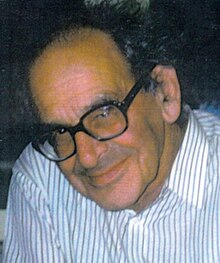Efim Etkind
Efim Etkind , also Jefim Grigorjewitsch Etkind transcribed ( Russian Ефим Григорьевич Эткинд ; * February 26, 1918 in Petrograd ; † November 22, 1999 in Potsdam ) was a Russian literary scholar and translator . In the Soviet Union , he was considered a dissident due to his research on literary translation .
Life
Etkind attended the Petri School in Petrograd until he graduated from high school . Thanks to the Soviet 'cleansing' of libraries with regard to bourgeois literature, which ended up as waste in the courtyard of his father's modest wrapping paper factory and was devoured by the boy who was hungry for reading, he found international literature early on and was already working in a small, privately organized company at the age of twelve Translation team with.
Etkind studied German , Slavic and Romance studies in Leningrad ; His teachers and leading figures included the literary scholar and philologist Wiktor Schirmunski and Roman Jakobson . During the Second World War, Etkind served as a propaganda officer in the Red Army due to his perfect knowledge of German and French. Already at that time he was accused of ' cosmopolitan anti-patriotism '. From 1952 he taught at the Pedagogical Heart Institute in Leningrad as a full professor; his main interest was in the history of poetry and the theory and history of translation. In 1974 his professorship was revoked and his doctorate and teaching and publication rights in the Soviet Union were revoked. He was mainly criticized for his contact with foreign literature and its authors (a natural consequence of his translation work), especially with Alexander Solzhenitsyn , whose manuscript of the Gulag archipelago he is said to have kept and smuggled to Paris, as well as Christa Wolf and Heinrich Böll , and his commitment to Joseph Brodsky in his show trial of alleged social parasitism (1964), as well as the alleged anti-Soviet orientation of his (Etkinds) research, i.e. as a so-called 'cosmopolitan'. He was finally banned from practicing the profession, i.e. H. Nobody outside of the university was allowed to hire or employ him. If you greeted him on the street, you were in real danger. In 1974, after being interrogated by the KGB under political pressure , Etkind submitted the only conceivable application for a Jew to leave Israel , whereupon he was expelled from the Soviet Union.
Jefim G. Etkind came to Paris in October 1974, where he completed his habilitation and from 1975 taught comparative literature at the University of Sorbonne, Paris X, in Nanterre as a full professor at the Institute for Slavonic Studies. When he died in Potsdam at the end of 1999, he had been associated for 10 years with the Germanist Elke Liebs , or had been married since 1994, whom he had met while visiting professor at the University of Oregon, Eugene.
Etkind's personal acquaintances and friends included Alexander Solzhenitsyn, Joseph Brodsky, Christa Wolf , Anna Achmatowa , Heinrich Böll , Lew Kopelew and Ilma Rakusa .
Efim G. Etkind has been a member of the German PEN Center since 1973, a member of the Bavarian Academy of Sciences since 1976 and a corresponding member of the German Academy for Language and Poetry since 1980. In France he was awarded the order 'Palme Academique' for his translation of A. Pushkin's complete works into the French language and was officially rehabilitated in St. Petersburg in the 1990s.
Works
- Bloodless execution. Why I had to leave the Soviet Union. Munich 1978.
- Russian poetry from the October Revolution to the present day. Attempt a representation. Munich 1984.
- Efim Etkind, Georges Nivat, Ilya Serman and Vittorio Strada: Histoire de la littérature russe , Vol. 1–6. Paris 1987-1996. (Multi-volume Russian literary history, also published in Italian and Russian).
- A Russian-language bibliography of his publications while he was still alive lists numerous other literary books (e.g. Der Stoff des Verses' and 'Dort drinnen') and translations as well as hundreds of articles in scientific journals.
literature
- Reinhard Lauer : The poetry of translation. Exchange of cultures. On the death of the literary scholar Efim Etkind . FAZ of November 26, 1999, p. 45.
- Arno Lustiger : Roots of a Cosmopolitan - Memory of Efim Etkind. In: Ders .: Sing with pain and anger. A life for the resistance. Berlin 2004, pp. 107-112.
- Ilma Rakusa: unwilling dissident. On the death of the Russian Germanist and translator Efim Etkind. ( Die Zeit , 49/1999)
- Elke Liebs : The melancholy of happiness - living with Efim G. Etkind. united pc publishing house 2013.
Individual evidence
| personal data | |
|---|---|
| SURNAME | Etkind, Efim |
| ALTERNATIVE NAMES | Etkind, Jefim Grigoryevich; Эткинд, Ефим Григорьевич (Russian spelling) |
| BRIEF DESCRIPTION | Russian literary scholar |
| DATE OF BIRTH | February 26, 1918 |
| PLACE OF BIRTH | Petrograd |
| DATE OF DEATH | November 22, 1999 |
| Place of death | Potsdam |
